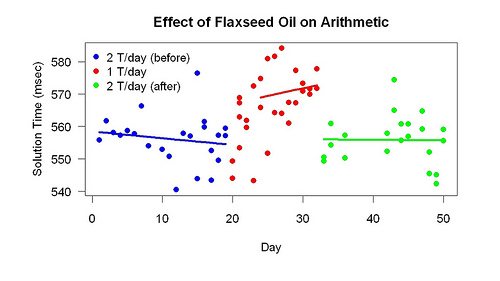After I moved to China in September, I was surprised that my arithmetic speed went down. (That is, I got faster.) I had lowered it from about 630 msec/problem to 600 msec/problem by eating lots of butter. I had no idea how to lower it further. I didn’t deliberately change my diet in China but it was quite different. I kept some things the same: the amount and brand of butter/day, the amount and brand of flaxseed oil/day.
I failed to figure out why I had gotten faster. I reduced the amount of flaxseed oil from 3 T (tablespoons) per day to 2 T per day. It made no difference. (In the beginning of my interest in flaxseed oil, change from 2 T/day to 3 T/day had made a difference.) Perhaps because of the butter.
Surprised that the change from 3 T/day to 2 T/day hadn’t made a difference, I went down to 1 T/day for two weeks, then back to 2 T/day. Both changes made a difference:

Each point is a separate test. Each test had 32 arithmetic problems (e.g., 3+4, 11-3). In the beginning of the data shown in the figure I tested myself once per day. After 12 days I started doing two tests/day, one right after the other. I was curious about the repeatability of the numbers; it wasn’t hard; it was a way to get better measurements. Averaging over the tests for each day to get one value per day, combining the 19 2-T/day (before) days and the 11 2-T/day (after) days, and comparing the combination to the final 7 1-T/day days, t (38) = 6.5. If you’re not familiar with t values, t = 2 is a barely reliable difference, t = 4 is a very clear difference.
This is more evidence that flaxseed oil improves brain function. It interests me because it implies the optimum dose is close to 2 T/day. It cost about $20 and took 1 person-month. In contrast, the DHA-Alzheimer’s study I mentioned two days ago cost about $1 million and took about 7000 person-months. And used (a) a cruder something-versus-nothing comparison, b) a less-sensitive between-subjects comparison, and (c) a more ethically-problematic placebo-controlled design.
I would be super-cautious about drawing wide conclusions from this kind of research because you’re not performing the task for its own sake: in your brain there are connections between the task and the experimental context. Maybe you produce the link because you want there to be a link, even though you may think you’re making the same degree of effort each time.
G, I wasn’t clear. I did this research to find the best dose of flaxseed oil. That flaxseed oil improved my brain function I had established to my satisfaction long ago. I would have preferred the opposite result (no difference) because it would have meant I needed less flaxseed oil. I live in Beijing, where good flaxseed oil is hard to get.
Almost no human psychological research has been done using tasks done for their own sake. Subjects are paid or doing it to satisfy a course requirement.
Of course, but the subject should not have a versted interest in a particular outcome. If you give subjects either a real drug or a placebo they cannot jinx the result by wanting the effect to arise because if the sample-size is large enough then that corrupting motive will be equally represented in both the drug and placebo samples. I think it also helps if the subjects aren’t the experimenters. But in blazingly clear-cut cases, like that guy who uncovered the true cause of ulcers, the results are too compelling to write off as bias and are easily repeatable/falsifiable.
How did you eliminate the problem of bias in your original studies?
You can learn more about my original studies, and whether to trust them, by reading these entries:
https://sethroberts.org/category/nutrition/omega-3/omega-3-directory/
If you think that stomach ulcer case is “blazingly clear” and Barry Marshall found “the true cause of ulcers” you should read this:
https://sethroberts.org/2009/04/03/nobel-prize-cluelessness-stomach-ulcers/
Marshall did not get an ulcer from his ingestion of the bacteria he says cause ulcers. And almost everyone who is infected with those bacteria doesn’t get an ulcer.
Bloody hell, I did not know that!
Do you think the Nobel Committe could do better than this? They don’t seem to have a great hit-rate overall; it would be interesting to look into just how many awards look dubious in hindsight.
Possibly there are omega 3 reseviors in the body, making the 2/3 T difference less marked. (as opposite tk wen starting). Reseviors can also work by different routes (like improvements in stability of other systems etc.)